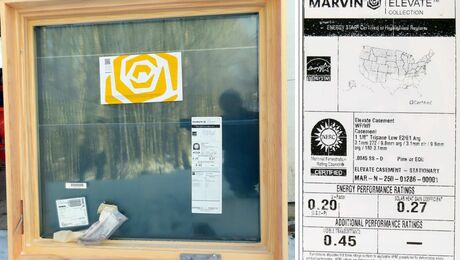“Fooling” a tankless hot water heater
In reading the article about the Chautauqua cottage renovation, the author mentioned that low water volume fixtures can “fool” a tankless hot water heater. (presumably not to come on) The author mentioned using a booster tank to help with the problem. Could someone explain what type of a tank this is and how it works?
GBA Detail Library
A collection of one thousand construction details organized by climate and house part









Replies
Joe,
Here's an article that explains what you need to know: Why Add a Tank to a Tankless Water Heater?
Newer models of tankless water heaters are doing a better job of responding to low-flow water draws. However, Michael Chandler's small-tank solution may still be worth considering.
Martin,
Thank you for directing me to this valuable piece of information.
Joe
I would do a practical test to determine if you need all of that extra hardware and piping: turn on your vanity sink faucet and see if it runs enough hot water per minute to activate the tankless unit you want to use. I did that and then installed a Takagi with a low-flow limit of about five-eighths of a GPM. It works fine with typical use at the vanity sink, which is likely the lowest flow fixture. Look at it this way, the tankless manufacturers know you have a bathroom sink and they have made sure their products work.
Regarding the cold water slug, yes it's an issue but in our house, everyone got used to it. I would not install a system like Michael's to solve that problem in my own house, although I recognize that he is replacing tanks for clients and needs to keep them happy with a different system.
David,
Thank you for sharing your perspective. Our situation is a new build; so I am trying to plan ahead.
Can you tell me what a "cold water slug" actually means in respect to length of time of the "slug"? Also, does "getting used to it" mean just standing outside the shower till everything is warmed up?
Joe, a cold water slug is really lukewarm, as the water picks up heat from the piping as it travels from the heater to the faucet. On our unit, there's a 3 second delay before the unit fires, and another 3 seconds before the water is fully hot. The biggest issue is with hand-washing dishes. You learn to wash a bunch of them and lay them in the sink, then turn on the water and rinse them all at once. If you take a shower right after someone else has turned it off, you have to wait for the water to get hot again. With a tankless, you are not just opening a tap, you are turning a machine on and off.
Yet another confirmation that fossil fuels in any form are not long-term energy solutions and that after 'conservation, conservation, conservation', on-site renewables are the way to go. For most of us, that is certainly going to mean PV.
For what it's worth that article was written back when propane was a lot less expensive than it is today. We are now installing heat pump water heaters and encouraging our clients to invest in grid tied solar PV.
I no longer do any recirculating hot water systems but now use an "asymmetrical fixture group piping" strategy developed with the immeasurably helpful advice of Gary Klein.
Sites like this and FHB are of huge value precisely because the best practices are constantly being tinkered with and performance is being measured and compared to predictions and improvements are being made. Our company is in major growth mode right now with three new hires this year and new offices and I promise that as soon as I can catch my breath I will post some of the results of our latest tinkering, eMonitor data, dis-proven assumptions, and corrections.
In the meantime I can only direct you to https://www.greenbuildingadvisor.com/blogs/dept/green-building-blog/stuff-i-learned-joe-lstiburek-s-house-part-1 but we have new stuff learned since then already and that piece is not even a year old.
God we're having fun down here in NC! (Even with the battle over the new "unpatriotic" building code, the "HERO code" and now "the marriage amendment") Like my ma used to say, if your hitting all your targets they aren't high enough or far enough away.
So...Michael, are you still using an "asymmetrical fixture group piping" strategy?
I have considered a heat pump but I can get my wife to sign onto solar PV. What are you doing for water heating these days?
Because of the flow threshold, and power-outage=instant-cold problems with an tankless system, I was also considering going for the tankless/small tank combo. But after I realized how minimal the standby loss is on a well insulated tank, I decided to save the hassle and got a Polaris:
http://www.americanwaterheater.com/products/productDetails.aspx?ID=1053
I wonder how many people end up wasting more energy by choosing a tankless system with a lower heating efficiency than a conventional tank heater. For our house, calculations showed standby loss was noise compared to that lost in heating efficiency. Ironically, even though the Polaris was more efficient than every tankless system at that time except the Takagi T-H1, I couldn't get the efficient water heater tax credit. So as usual, hype is worth more than reality to the gov.